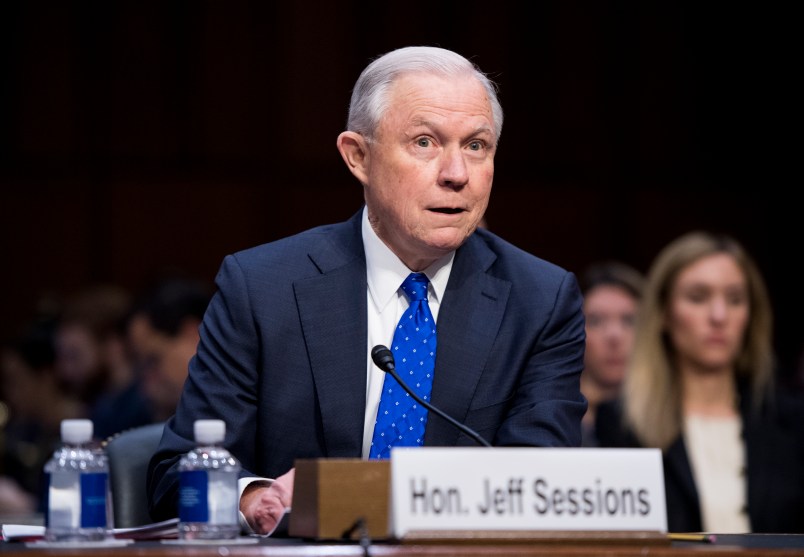WASHINGTON (AP) — The top Democrat on the House intelligence committee says Attorney General Jeff Sessions would not directly answer in a closed-door interview Thursday whether President Donald Trump ever asked him to hinder the Justice Department’s investigation into Russian interference.
Sessions’ refusal to answer the question from California Rep. Adam Schiff during the committee’s interview was similar to his previous responses to lawmakers’ questions in several open hearings earlier this year. He has repeatedly said he will not discuss any conversations with Trump, saying he was adhering to longstanding tradition of Justice Department leaders to refrain from revealing the contents of private conversations with the president.
Schiff said it is “disturbing” that Sessions wouldn’t answer that particular question.
“Congress has a need to know and so do the American people,” Schiff said.
Sarah Isgur Flores, a spokeswoman for Sessions, pushed back on Schiff’s comments, saying the attorney general told the committee that he has “never been directed to do anything illegal or improper.”
Sessions’ appearance is part of the House panel’s investigation into Russian interference in the 2016 election and whether there are any links to Trump’s campaign. Sessions has previously testified on the issue in open hearings in three other congressional committees.
Lawmakers have been interested in Sessions’ knowledge about contacts between Russians and the Trump campaign as well as Sessions’ own contacts with Russians. He told the House Judiciary Committee this month in an open hearing that sleep deprivation and the “chaos” of the presidential campaign clouded his recollections of contacts with Russians.
At his January confirmation hearing, the former Alabama senator said he “did not have communications” with Russians during the campaign and that he was “unaware” of contacts between others in the campaign and Russia. But he later acknowledged two previously undisclosed encounters with the Russian ambassador in Washington.
The questions have only deepened since the guilty plea last month of George Papadopoulos, a former Trump adviser who served on the council Sessions chaired and who proposed arranging a meeting between Trump and Russian President Vladimir Putin. As well, another aide, Carter Page, told Congress in private statements that he had alerted Sessions about a meeting he planned in Russia during the campaign.
Sessions has said he had no recollection of the conversation with Page. And he said he told Papadopoulos that he was not authorized to represent the Trump campaign with the Russian government or any other foreign government.
Papadopoulos was arrested by the FBI and pleaded guilty to lying to authorities about his own foreign contacts during the campaign.
Schiff said lawmakers on the House intelligence panel “extensively covered” the interactions Sessions had with Page and Papadopoulos. He said they also asked questions about his prior testimony “and the interactions the campaign had with Russia and Russian representatives, which we now know were quite extensive.”
Separately Thursday, Roger Stone, a longtime friend of Trump, says a New York radio host “merely confirmed” to him last year that Wikileaks founder Julian Assange had emails he planned to release about Hillary Clinton.
Stone initially resisted telling the House Intelligence panel the identity of the intermediary he says he used to communicate with Assange during the campaign. Stone now says the intermediary was radio host Randy Credico.
Stone told the Associated Press on Thursday that Credico verified for him “what Assange had said publicly.”
“He was correct. Wikileaks did have the goods on Hillary (Clinton) and they did release them,” Stone said, referring to a trove of hacked emails from Clinton campaign chairman John Podesta.
U.S. intelligence agencies have identified Assange as a pass-through for Russian intelligence and as an asset used by Putin during last year’s election. Stone and Credico dispute that assertion as does Assange.
Stone’s statement comes just two days after Credico tweeted a picture of what he says is a subpoena to testify before the House committee on Dec. 15. A committee spokeswoman did not immediately confirm the veracity of the subpoena.
Stone has been the subject of investigation by that committee partly because of his communications with Assange and with Guccifer 2.0 — an account tied to Russian hackers. Stone released his exchanges with Guccifer 2.0 before his House appearance in September.







There’s so much that’s “disturbing” in today’s news.
With respect, Congressman, there isn’t anything about Jeff Sessions that isn’t disturbing.
Schiff basically got Sessions to a point where he could not state under oath that Trump didn’t direct him to obstruct or interfere in the investigation. This is more confirmation to me that Sessions is cooperating with the Mueller investigation and is not continuing to lie to cover Trump but is also keeping himself in the game long enough to give Mueller the space to keep moving forward and get his guilty pleas and indictments.
It’s disturbing all right. I suppose he can’t be compelled by the committee to answer that question. What happens if he’s asked by Mueller?
The absent minded professer …
tricksy pixie …
notrememberin gremlin …
nonrecollect height reject …
forgetaboutit dwarf…
don’tremember halfmember…
abstracted lilliputian …
sievebrain minusculian …